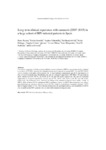Long-term clinical experience with darunavir (2007–2015) in a large cohort of HIV-infected patients in Spain authors

Ver/Abrir
Use este enlace para citar
http://hdl.handle.net/2183/18373Colecciones
- INIBIC-VC - Artigos [37]
- INIBIC-ECB - Artigos [50]
Metadatos
Mostrar el registro completo del ítemTítulo
Long-term clinical experience with darunavir (2007–2015) in a large cohort of HIV-infected patients in Spain authorsAutor(es)
Fecha
2016-06-06Cita bibliográfica
Pernas B, Grandal M, Tabernilla A, et al. Long-term clinical experience with darunavir (2007–2015) in a large cohort of HIV-infected patients in Spain authors. J Med Vir. 2016;88(12):2125-31
Resumen
[Abstract] The clinical experience with the protease inhibitor darunavir/ritonavir (DRV/r) was retrospectively evaluated in a cohort of 173 HIV+ patients who initiated antiretroviral treatment including DRV/r (period 2007–2015). The 43.2% had a CD4 nadir ≤100 cells/mm3, 64.1% were treatment-experienced, and 36.5% had failed to >3 lines of antiretroviral therapy. Nonetheless, the rate of virological suppression (HIV-RNA <50 copies/ml) in naïve patients was 63%, 66.7%, and 63.6% at 48, 96, and 144 weeks, respectively. The rate of virological suppression in treatment-experienced patients was 62.7%, 78.7%, and 79.1% at 48, 96, and 144 weeks, respectively. No differences were observed according to the immunovirological status neither dosage of DRV/r. Most of them (82.6%) maintained DRV/r treatment. Causes for DRV/r discontinuation were mainly gastrointestinal and cutaneous adverse events (10.5%), switch to simplification treatment strategies (3.5%) and virological failure (1.7%). These findings demonstrate the prolonged efficacy and tolerability of DRV/r even in multi-treated HIV+ patients with an unfavorable immunovirological status.
Palabras clave
HIV infection
Darunavir
Efficacy
Safety
Darunavir
Efficacy
Safety
Versión del editor
Derechos
This is the peer reviewed version of the article which has been published in final form at Wiley Online Library. This article may be used for non-commercial purposes in accordance with Wiley Terms and Conditions for self-archiving
ISSN
0146-6615
1096-9071
1096-9071





